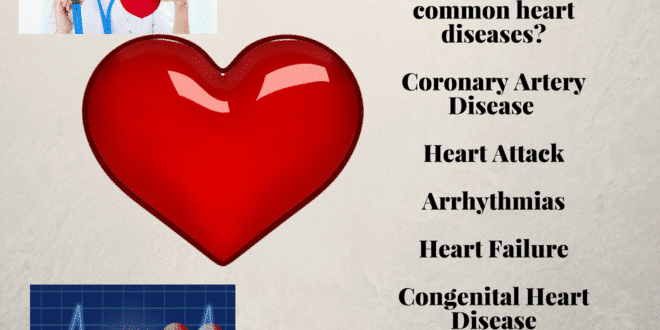Most Common Heart Diseases and Treatments
There are several common heart-related illnesses and heart diseases that can be treated by your doctor and by your improved diet and exercise.
Coronary Artery Disease
This disease is characterized by a narrowing of the arteries caused by plaque build-up. This build-up restricts and blocks blood flow and causes your heart (and your entire body) to be starved of life-giving oxygen.
Often, the artery produces new blood vessels that can go around the blockage. But other times the plaque gets so bad that blood clots form and this causes an even bigger blockage, which then bursts and causes a heart attack.
To treat this type of heart disease will depend on how bad it is. Sometimes diet and exercise are prescribed, and sometimes drugs are prescribed. If it’s serious, you may have to get surgery and then go through cardiac rehab to build your heart stronger than it was before, as well as get trained in how to eat correctly.
Heart Attack
Whether you live through a heart attack will depend on why you had one. They may give you aspirin to avoid more clotting. They will treat the chest pain, and also provide nitroglycerin which will improve blood flow and stop your heart having to work too hard. Often, they also provide oxygen therapy.
If the situation is dire enough, they may need to perform open heart surgery to repair the damage. That may mean a bypass surgery to use a healthy artery or vein from your leg to graft around the blocked section of your heart to provide new blood flow.
Arrhythmias
An arrhythmia is an irregular heartbeat. Most are not harmful, but you may have the type that is causing problems such as fainting spells or other issues. If your arrhythmia is caused by AFib (atrial fibrillation), they may give you medication to prevent blood clots from forming. The goal they’ll have for you is to improve and control your heart rhythm or treat any underlying condition causing the arrhythmias.
It’s important if you’ve been prescribed medication to take it as directed. Keep an eye on your pulse and stay healthy. Avoid caffeine, tobacco, alcohol, certain cold medications, appetite suppressants, and other drugs that can cause these symptoms in some people.
Heart Failure
Some people think heart failure is the same as a heart attack, but it’s not. Heart failure is also called congestive heart failure. It affects almost 700,000 people each year. It’s more likely to affect people over the age of 60.
Heart failure is when the blood is moving through the heart at a slower rate and therefore the body is not getting enough nutrients to meet your needs. The heart will try to stretch and hold more blood, but this won’t make it better. The patient often feels dizzy, weak and extremely fatigued.
Treatment for heart failure is permanent and requires diligence on your part to get healthier. But the focus is on stopping the progression of the disease and to give you a good quality of life.
There are four stages of heart failure and your treatment will depend on the stage. At stage one you’ll get treatment for any lipid problems such as high cholesterol; your high blood pressure will be rated, and they’ll want you to quit smoking. For the last stage, stage D, you will get all the treatments for the other issues plus be evaluated for potential transplant.
Congenital Heart Disease
Some congenital heart diseases need treatment, while others congenital heart diseases don’t. There are many considerations such as the overall health of the patient, their age, and their size. Depending on how complex the issue is, it may take several surgeries and lifelong treatment to keep heart problems under control.
Treatment might involve a catheter procedure, which is a lot easier than surgery. Usually, it’s just a needle procedure, and then the thin tube (catheter) is inserted into the vein or artery to provide structure and better blood flow. Sometimes a patient needs open heart surgery to fix the heart to close holes, repair heart valves, widen arteries, and repair defects.
Regardless of your genetics, today’s heart medicine is very advanced. Most heart diseases can be managed if not cured entirely depending on the issue. Never think you’re at the mercy of your genetics. Most people can change their lifestyle today and feel better and be better within the next 90 days.
The important thing is to keep on top of your health. Get a yearly physical. Eat right most of the time, and move more. It is that simple for most people. Avoid processed food, avoid eating saturated fat, and avoid added sugar. Eat as close to nature as possible, stay hydrated, and be active.
Read more
A Simple Guide To Being Heart Healthy
What causes high blood pressure?
I would love to connect with you!
You can find me on PINTEREST, FACEBOOK, TWITTER1, TWITER2, INSTAGRAM or GOOGLE+
Join my Pinterest group board here
Visit us on Pinterest
SHARE THIS!
LEAVE YOUR COMMENTS/VIEWS BELOW








2 Comments
Pingback: How many is too many when it comes to energy drinks? - Healthy Lifestyle
Pingback: Don’t avoid the sun and practice moderate sun exposure - Healthy Lifestyle